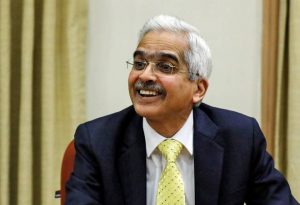 New Delhi: While reassuring that the Indian banking sector is safe and sound, the Reserve Bank of India on Friday (March 27, 2020) appealed to the general public not to resort to panic withdrawal from private banks amid country’s fight against the coronavirus pandemic. “The Indian banking sector is safe & sound. Depositors of commercial banks including the private banks need not worry about the safety of their funds,’’ RBI Governor Shaktikanta Das said.
New Delhi: While reassuring that the Indian banking sector is safe and sound, the Reserve Bank of India on Friday (March 27, 2020) appealed to the general public not to resort to panic withdrawal from private banks amid country’s fight against the coronavirus pandemic. “The Indian banking sector is safe & sound. Depositors of commercial banks including the private banks need not worry about the safety of their funds,’’ RBI Governor Shaktikanta Das said.
“Depositors should not resort to panic withdrawal of their deposits. Would urge those with deposits in private banks to not indulge in panic withdrawal. The macros stronger than what it was post the financial crisis, the fiscal deficit and CAD is much lower and inflation conditions are benign. I remain optimistic despite current challenges. COVID-19 is upon us but this too shall pass. Stay clean, stay safe and go digital,’’ the RBI Governor said in his appeal to people.
Calling the coronavirus COVID-19 pandemic an ”unprecedented threat and invisible assassin”, the Central Bank also cut the Repo Rate by 75 basis points to 4.4 per cent and slashed Reverse Repo Rate by 90 basis points to 4 per cent as part of measures to ease the pain on banks and industries which are suffering from the 21-day lockdown.
Announcing this, the RBI Governor said, “Repo rate has been reduced by 75 basis points to 4.4.%. Reverse repo-rate reduced by 90 basis points to 4%.’’ He added that the RBI Monetary policy committee voted 4:2 majority to cut 75 basis points to 4.4 pc during its meeting between March 25-27.
He further informed that the Cash Reserve Ratio of all banks has been reduced by 100 basis point to 3% from March 28, 2020 for a period of 1 year. This will release 1.37 lakh crore. Describing the Coronavirus pandemic as an ”invisible assassin”, the RBI chief said that all these measures will release 3.74 lakh crore into the system and ease pressure on the banks.
The central bank also permitted all banks and lending institutions to allow a 3-month moratorium on all loans. ”All lending institutions allowed to defer interest on working capital repayments by 3 months. The moratorium on term loans, deferment of interest payment will not result in asset classification downgrade and banks may reassess working capital cycle. It will not be treated as NPA,” the RBI Governor said.
He added that at present, the priority is to undertake strong and purposeful action to protect domestic economy. “Need for all stakeholders to fight against the pandemic and banks should do all they can to keep credit flowing. Indian bank system is safe and sound. Public should not worry about their deposit in private sector banks, they should not resort to panic withdrawal,” Das said.
Among other measures, he said, ”Incremental CCB (capital conservation buffer) implementation deferred from March 30, 2020 to Sep 30, 2020. Offshore Rupee NDF Market has been growing rapidly. Net Stable Funding Ratio (NSFR) was required to be introduced from April 1, 2020. Will defer NSFR implementation to October 2020.”
“Large sell offs in markets have intensified pressure. RBI will conduct auctions of long term repo operation (LTRO) of three-year tenure upto Rs1 lakh crore at floating rate linked to policy rate,” the RBI Governor said.
The move was expected as the central bank, in the past few days, has been actively engaging with the market through repo operations to infuse significant liquidity into the system to ensure that the financial system doesn’t turn illiquid. The central bank has also been doing rupee dollar swap operations to minimise the currency swings.
Beginning March 25, for a period of three weeks, India is under a complete lock-down to curb the spread of the COVID-19. This will have an impact across key economic segments including manufacturing, services, construction and tourism.
On March 26, the government announced a mix of measures including direct cash transfers and distribution of free food grains for a period of three months to help the economically weaker sections of the society tide over the crisis phase. Now, the RBI Governor is expected to spell out more measures.
Bureau Report
Leave a Reply